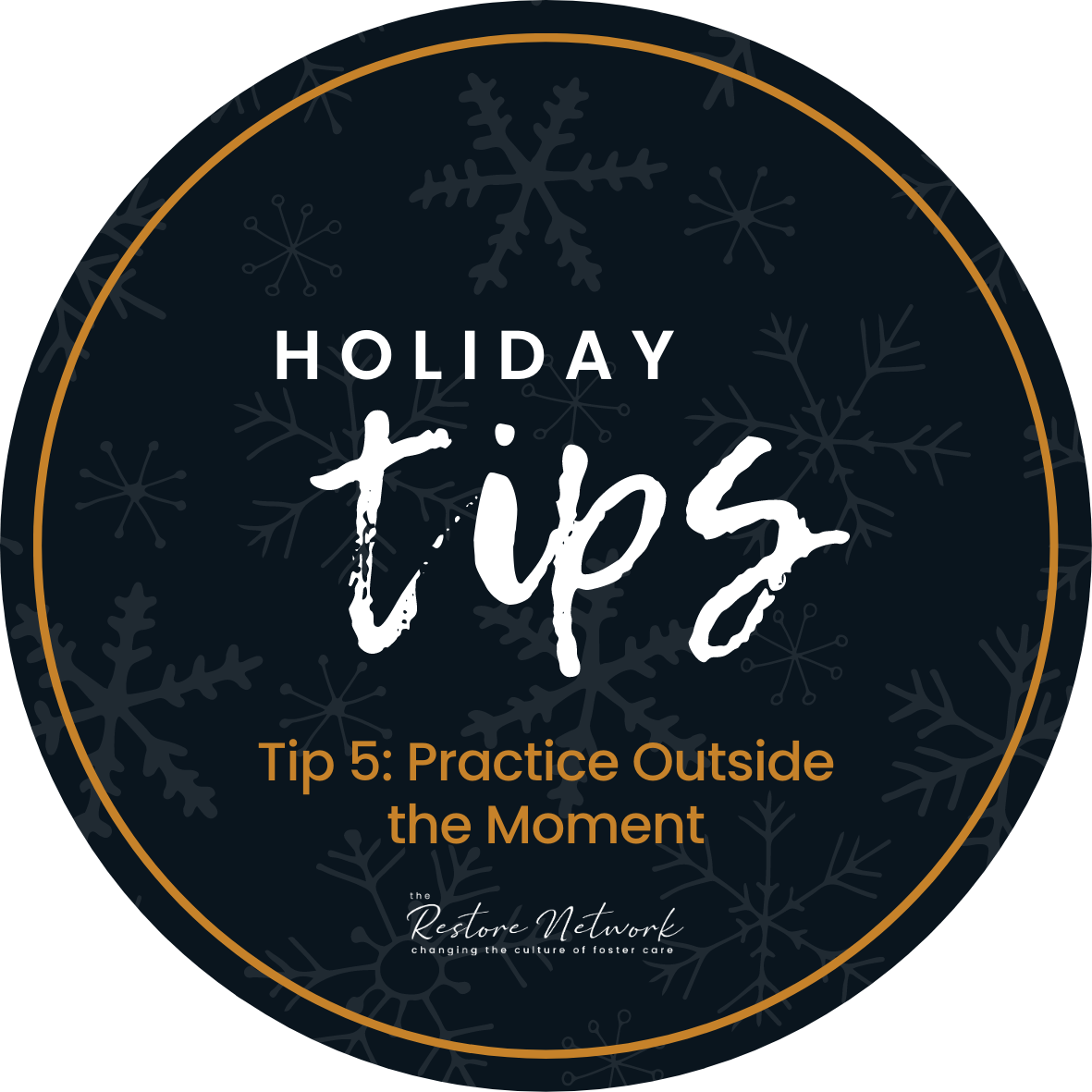by Ashley Bennett, Director of Trauma-Informed Care
We’ve talked a little bit in this space about making life predictable for our children and how important it is to communicate with them about the things they will experience-especially when new. You can take that communication even further by doing something called “practicing outside of the moment.”
It’s easy to welcome a child, especially an older child, and assume that he has had experiences appropriate for his age. That he has celebrated a birthday party. That he has exchanged Christmas gifts with his family. That he knows how to handle a large gathering during the holidays. But after parenting a few children through foster care, I have come to the belief that if I didn’t teach them the skill myself, I should just assume they don’t know it and go from there!
So, let’s consider for a minute what skills our children might need to help the holidays be more successful.
- Handling large gatherings—although less likely during this season!
- Traveling-again, less likely this season!
- Patience. Patience. Patience.
- Taking turns & sharing
- Showing appreciation.
- Meeting new people.
- Handling the routine change of being off school for two weeks.
Now as you read that list, you probably thought of a child in your family who struggles with one or more of these areas and you are already anticipating frustration in dealing with it again this year. As you identify one or more of these areas you’d like to see your child grow in, consider what it would look like for you to make the time to practice it now.
Our children can benefit from instructions given in a kind and playful way before they are placed in the circumstance where they need to remember what they learned.
For instance, do you have a child who you think is going to struggle to regulate enough to take turns Christmas morning opening gifts? What would it look like for you to practice this? Could you wrap up small items around the house and practice taking turns opening them with the child? Pausing to enjoy each item and showing him how to patiently watch others as they open their gifts too.
Younger children can also learn by using objects to teach these same lessons. Grab your daughter’s favorite Barbies and your son’s favorite dinosaurs and play act out with them. Have a dinosaur family patiently waiting while each member opens a pretend gift. We would call this “the right way!” Then have one of the dinosaurs grabbing everyone’s gifts and tearing into them quickly. We would call this “the wrong way!” Have the parent and child practice doing it both ways. Laugh about the silly dinosaur doing it the wrong way and practice this a handful of times leading up until Christmas morning. When you get to Christmas, your child should either be able to remember the right way he’s now been taught or be easily reminded with a simple phrase like, “Hey buddy, how would a dinosaur open his gifts?” (In fact there’s a whole book series like this that my toddler and I love: https://www.janeyolen.com/?s=dinosaur).
Maybe your child struggles with meeting new people and you need to role play that scenario.
Maybe your child struggles showing appreciation and you need to give him scripts he can use when he receives a gift that’s not his favorite. You can role play this with dinosaurs! Or Lego people! Or dolls!
The language of children is play. This is how they learn and test out real-life scenarios so practicing outside of the moment in the areas that bring them the most challenge can be very effective in changing patterns of negative behaviors.
These playful interactions don’t have to last long—some of these lessons you could do in 10 minutes a couple times a week and they might make an impact in your success this holiday season.
Likewise, if you know there are particular ways that your child struggled in the past, it can be helpful to bring these struggles to the child in a kind manner and help them make a plan “for next time.”
For instance, last year at the big family gathering your son seemed to really struggle and the night ended in a major control battle between the two of you. You’ve noticed this pattern in him when there are lots of people around or he’s in a new experience. Instead of waiting for a repeat of last year, go to your son now and say, “I noticed last year at the family gathering you seemed to feel really out of place and overwhelmed and the night didn’t end well. How can we make a plan where you can be more successful this year?”
Giving your child space to think about it, pointing out what you’ve seen, and coming up with a plan together can be very empowering for your son, uniting you as allies instead of enemies in these moments of struggle. Your child might request to bring something from home to help him, he might request the ability to find a quiet place to hang out halfway through the night so he can recharge, or maybe a code word between the two of you can result in you stepping in to help with a situation he’s uncomfortable in.
Calling attention to areas your child struggles with in an empathetic way with a desire to help him succeed, empowers your child to have his needs met and gives him voice, two very important things for children placed with us through foster care.
This week, I encourage you to consider-what do you need to practice with your child today? What conversations need to happen now, so you can have a successful holiday this year?
